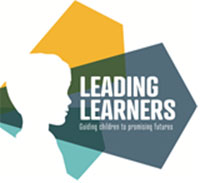Butterfly Room
Worth Valley Resourced Provision 
Staffing:

Amy Waddington- Lead Teacher of Resourced Provision (Butterfly Class)/ SENCo

Dawn Allsopp- Level 3 cover SEND teaching assistant

Shazia Choudhry- SEND Teaching Assistant

Fiona Baldwin- SEND Teaching Assistant

Julie Clarke- SEND Teaching Assistant

Abbie Butterfield-SEND Teaching Assistant/Well Being and Pastoral Care
Rationale

The definitive purpose of Worth Valley Resourced Provision is to effectively meet the needs of pupils primarily with a diagnosis of ASD but does support some pupils with differing needs that benefit from the learning approaches and strategies used in the Butterfly room. As a resourced provision the purpose is to support the pupils’ learning by creating individualised planning, learning experiences and learning environments tailored to the individual needs of each pupil.
The provision is now known as the Butterfly room and pupils based in the provision will be known as the ‘Butterfly Class’. This symbolises the learning journey of the pupils in comparison to the development cycle of a butterfly. As a result, the learning and the curriculum carried out in the provision will be based around this theme and representation. The aim of the provision is to be a welcoming, happy and safe place all children can come to explore, be calm, refocus and take part in a variety of small group or 1:1 focussed sessions. The provision is known as The Butterfly Room and the Butterfly Class to celebrate the uniqueness and journey of the children. Our aim is to make the Butterfly room a central ‘hub’ in the school that pupils and staff understand and recognise. In terms of a resourced provision, this is a relatively new concept for Worth Valley Primary and so both the provision and mainstream part of the school are taking this journey growing together.
Keyword symbols using the Boardmaker programme underpin the learning, structure, resources and communication in the Butterfly room. Lessons carried out in the Butterfly room are made up of a carousel of short focussed activities that support the engagement of pupils and the development of experiences and skills throughout the lesson. Each activity is different to promote the development and reinforcement of skills in different ways, e.g. 1:1 activity, tactile exploratory activity using tuff tray and focussed individual activity at workstation. Pupils are encouraged to carry these out as independently as possible and through pupil feedback the level of support is clearly detailed, e.g. verbal prompt/support, physical prompt/support, handover hand, etc.
Worth Valley Primary School Resourced Provision is working towards becoming an effective, dynamic learning environment that has a strong purpose for both staff and pupils.
Routines, Risk Assessments and Policies
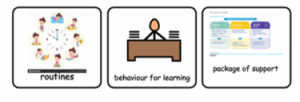
The learning and routines in the resourced provision for pupils are very structured. Pupils are verbally and physically prompted by adults to use schedules with now and next boards to identify different times of the day. Pupils will be encouraged to independently use these resources by organising their learning throughout their time in the resourced provision. The provision outlined within EHCPs is effectively carried out through enhanced adult-pupil ratio and carousel led adult support for 1:1 and small group support.
Please find below some of the support, resources, strategies we can offer pupils in the Butterfly room at Worth Valley Primary School:
- Adapted curriculum to suit pupil learning abilities and resources/activities/support to meet individual pupil learning needs.
- Resources and strategies used to meet pupil sensory needs, e.g. timetabled sensory/explore sessions, sensory room sessions with appropriate targets to develop, deep pressure, intensive interaction, sensory massage.
- Positive Intervention plan and/or risk assessment in place which would extensively detail information regarding pupil behaviour and the strategies that effectively support pupil movement in different areas around school.
- Baseline conducted of pupil’s learning ability using appropriate SEND assessment strategy, targets generated as a result.
- Support from the relevant professionals, e.g. SALT/OT/educational psychologist to enhance pupil learning packages within the resourced provision.
- One-page profile and Individual Education Plan that includes targets that are reviewed every half term.
- A carefully planned transition plan of time spent in the Butterfly room and developing time spent in the mainstream classroom and mainstream part of the school with both staff and parents in agreement (this would be a working document that is flexible to meet pupil needs).
- Home/school communication daily with involvement from pupil about their day.
- Daily opportunities for pupil to interact with age related peers from mainstream part of the school- either in mainstream classroom or Butterfly room these will either be formal activities or during informal times such as break time, etc. (detailed information included in transition plan).
The transition plan will be created and shared with parents and relevant professionals within the first half term of the pupil transitioning to the resourced provision.
Information about the different areas of the Butterfly room can be found in this section of the website. The Butterfly room risk assessment outlines information about the alleviation of potential risks in the different areas of the Butterfly room, please see attached in this section.
The resourced provision follows the school behaviour policy with reasonable adjustments made to meet the needs of the resourced provision pupils. Enhanced strategies are used alongside resources such as Boardmaker symbols, traffic lights and repair and reflect to support pupils through times of crisis and periods of behaviour escalation. If needed and warranted, a pupil with have a comprehensive positive intervention plan in place that thoroughly details information about the pupil and the strategies used to positively and safely support the pupil. Some pupils spend time in the calm room as part of their outlined strategies, this is to promote self-regulation with observation and/or support from an adult used in a structured and familiar way for the pupil. More information regarding the calm room can be found as part of the individual strategies used in pupil positive intervention plans.
Curriculum

Within the resourced provision pupils utilise an individual package of learning and support to cater for individual and often complex needs. The Area guidelines for SEND and alternative provision states that ‘In SRP pupils spend most of their time (usually well over 50% of their timetable) in mainstream classes. They only attend the SRP facilities for individual support…’ this is a long term target for all pupils based in the provision regardless of their complex needs as we would never place limitations on any of our pupils however in reality some pupils do spend more time accessing the resourced provision rather than the mainstream class- this is comprehensively detailed in the pupil’s transition package.
As a result, pupils carry out English functional skill lessons, maths lessons, topic lessons and PSED and sensory/explore lessons which focus on individual pupil targets, developing life skills and communication skills. Evidence of progression towards individual targets is documented in different ways such as written work with keyword symbols, adult observations and photographs. Pupils learn different information in context to their understanding through topic work. Pupils learn about different themes for topic every term so that opportunities are given to the pupils to explore different foundation subjects and the development of different skills related to the theme. The themes selected for pupils to learn about are current and in context to their understanding with links to the key stage 1 and key stage 2 national curriculum (dependant on pupil age). Topic coverage is documented so that there is an equal balance of subjects being carried out. We are currently developing the curriculum topic cycle as more pupils transition to the provision.
Where possible resourced provision pupils take part in foundation subjects and phonics sessions within their mainstream class cohort. Pupils are supported by adults during these times and the lead teacher of the resourced provision liaises with adults in the mainstream class so that they feel confident and knowledgeable when supporting these pupils.
Assessment

Carrying out assessment allows us to decide how pupils are currently developing in their learning (their starting points), where they need to go and how best to get them there. Some pupils who transition in to the resourced provision may have experienced extended periods time out of a learning environment or their experiences of their previous setting may have been a barrier to their learning. Attempting to develop an accurate picture of how each pupil learns with regards to their needs is very important.
When supporting pupils with additional needs, it is important that small steps are identified to ensure progression. Within school we use a bespoke assessment tool matched to the curriculum used in the resourced provision.
We continually follow the Assess, Plan, Do and Review cycle to allow pupils to make progress in their learning through highly individualised targets which are matched to their specific needs. Both in the resourced provision and mainstream classes teachers acknowledge what pupils already know, what the next steps will be and how to support pupils to make this progress.
Assessment may take place individually or in groups through observation, written work as well as pupil feedback about their work. Motivation and promotion of independence and pupil’s taking responsibility for their own learning is also key. The highest expectations are maintained for all pupils regardless of need.
Ongoing (Formative) assessment whereby teachers will make observations of children’s work, annotate planning, use questioning to clarify understanding, talk to children in the form of learning conversations and use pupil feedback. Some specific assessments used by the RP teacher or mainstream teacher may act as formative assessment to identify strengths and weaknesses in areas of learning.
Termly (Summative) assessment whereby teachers will use a variety of assessment to record pupil achievements based on day to day evidence and record if children are working at, above or below their age expectation at the end of the academic year. This is entered onto our school tracking system to monitor progress, e.g. phonics screening/SATS if can be carried out by pupil.
Pupils with SEND (resourced provision pupils and pupils with SEND from mainstream classes) have one-page profiles and provision maps in place that summarise all strategies, assessment and interventions in place. Termly progress monitoring with key staff is used to review progress and identify next steps of support (Further information is included in our SEND Policy and SEND Information Report).
In the resourced provision to assess pupil progression we use the PIVATS 5 assessment framework. The PIVATS framework work uses descriptors from the key stage 1 and key stage 2 curriculum and breaks them down into smaller, realistic and achievable skills for pupils to develop. PIVATS is a relevant assessment tool showing progression in learning which can be used to assess and track progress and inform pupils’ individual education plans. The areas of assessment include: reading/writing/listening/speaking/number/using and applying/shape, space and measure/PSED behaviour for learning/PSED emotional aspects/PSED personal independence.
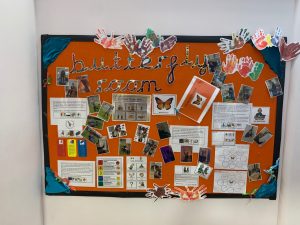
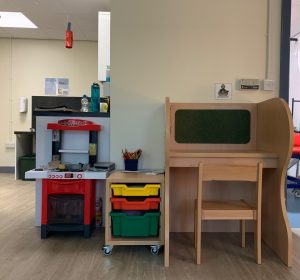
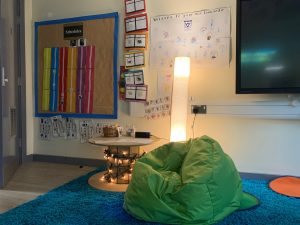
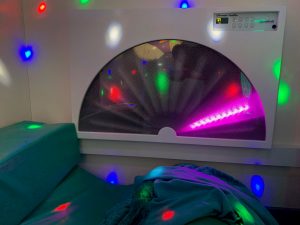
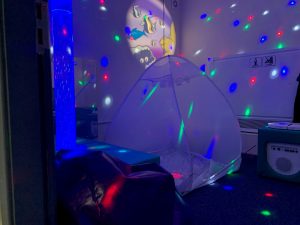
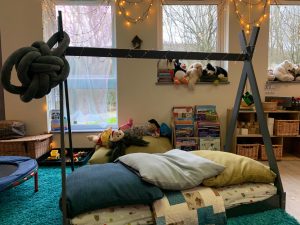
At Worth Valley Primary School, safeguarding is of paramount importance. We are committed to ensuring the welfare and safety of all our children and staff in school.

